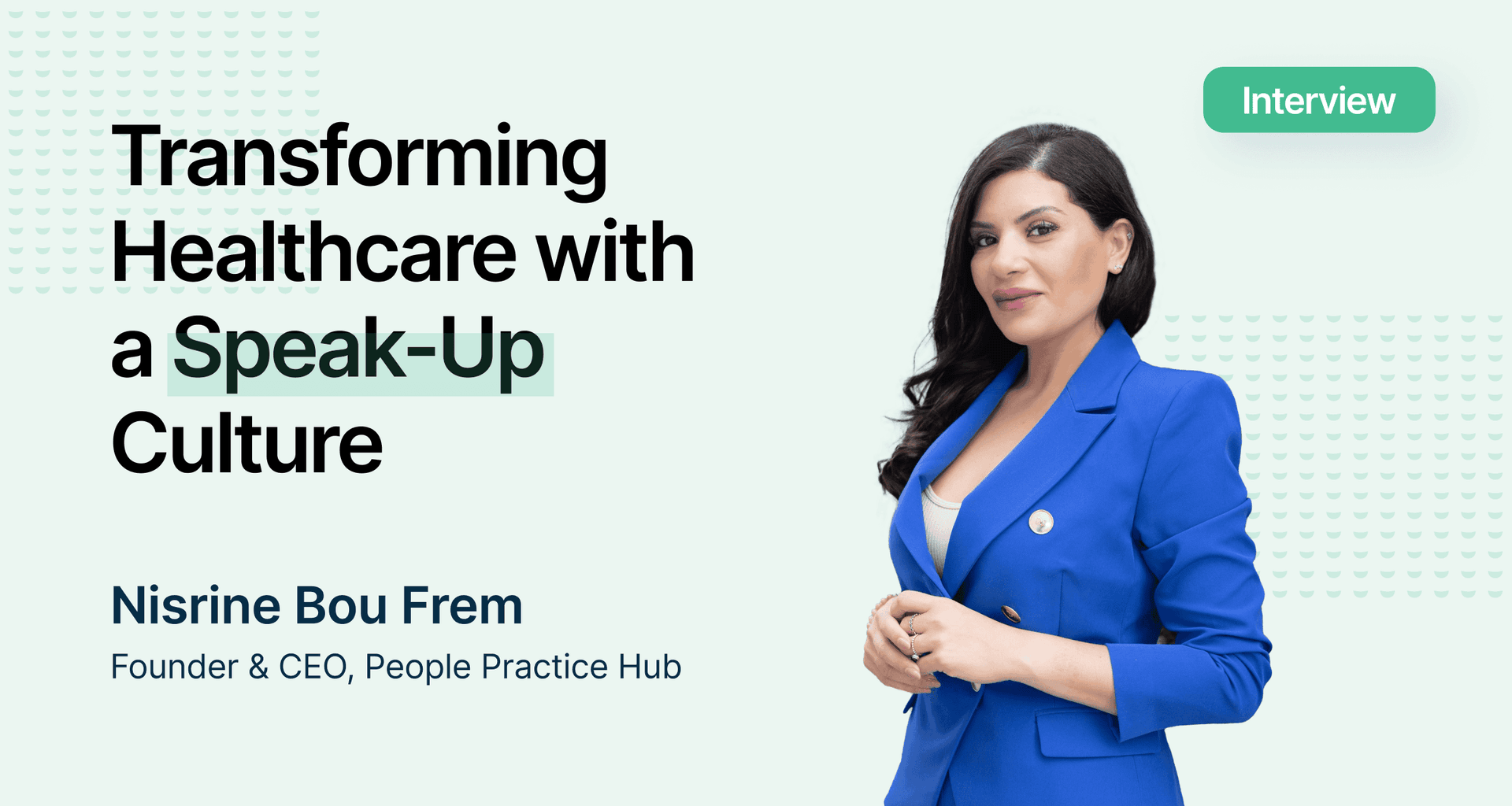Empowering the Healthcare Industry Through Open Communication: An Interview with Nisrine Bou Frem
Workplace Environment

Ry Hallada
Content Manager
Published
2024-09-04
Reading time
5 min


Table of contents
Subscribe to our newsletter
In the rapidly evolving world of healthcare, every decision can be a matter of life and death. Cultivating an environment where employees are empowered to voice their concerns is crucial.
Building a strong speak-up culture helps identify and address issues before they escalate and is essential for ensuring the highest standards of patient care, safety, and overall organizational effectiveness. Join us as we explore these themes with Nisrine Bou Frem, Founder and CEO of People Practice Hub.
As a seasoned corporate executive with over fifteen years in the medical industry, Nisrine founded People Practice Hub (PPH) in 2018 to address the need for regional expertise in healthcare. PPH has since emerged as a leading health and wellbeing consultancy, offering specialized services to non-medical practitioners, patients, and medical professionals.
Our discussion with Nisrine underscores the importance of open communication in high-stakes environments like medical tourism and hospital management. Through her leadership, PPH provides top-standard services supported by a global network of medical experts, ensuring flexible and accessible advisory services that enhance decision-making and care quality in the healthcare sector.
The Role of Speak-up Culture in Healthcare
Kristýna:
As the founder of People Practice Hub, how do you see the role of a strong speak-up culture in improving both employee engagement and patient outcomes?
Nisrine:
“I genuinely believe that a strong speak-up culture is pivotal in the healthcare sector, not just for enhancing employee engagement but also for significantly improving patient outcomes.”
Kristýna:
From your experience, what are the most common signs of a dysfunctional company culture, particularly in healthcare, and how can leaders address these issues effectively?
Nisrine:
“There are several common signs of a dysfunctional company culture, especially in the healthcare sector. Here are a few key indicators:
- High Employee Turnover
- Poor Communication
- Low Morale and Burnout
- Lack of Accountability
- Resistance to Change.
Leaders can address these issues by fostering open communication and investing in employee well-being. It’s important to provide a clear vision and leadership that promotes accountability and learning, for example.”
Employee Empowerment and Feedback
Kristýna:
How does your company empower medical teams to feel confident in raising concerns or sharing feedback, particularly in a high-pressure environment like healthcare?
"Empowering medical teams to feel confident in raising concerns or sharing feedback is crucial for maintaining a healthy, effective, and safe healthcare environment."
Nisrine:
“Empowering medical teams to feel confident in raising concerns or sharing feedback is crucial for maintaining a healthy, effective, and safe healthcare environment. Here are some strategies that we implement to achieve this:
- Open-Door Policy
- Anonymous Feedback Channels
- Regular Check-Ins
- Training and Development
- Non-Punitive Reporting Systems
- Leadership by Example
- Recognition and Rewards”
Transparent Communication Is Critical
Kristýna:
In your work facilitating international medical tourism, how important is transparent communication to ensure a high-quality experience?
Nisrine:
“Transparent communication between medical professionals and patients is absolutely critical in ensuring a high-quality experience in the context of international medical tourism, as it builds trust that affects patient overall experience and satisfaction.”
Strategies for Building Trust
Kristýna:
What strategies do you use to build trust and encourage open communication across the diverse teams you work with, especially in different countries and healthcare systems?
Nisrine:
“Building trust and encouraging open communication across diverse teams in different countries and healthcare systems is essential for the success of international medical tourism.
Our strategy focuses on training all team members on cultural sensitivity and awareness. Understanding cultural nuances can prevent misunderstandings and foster a more inclusive environment.
We also engage with local experts to gain insights into each country's cultural practices and communication styles.
This combined approach has helped us implement standardized communication protocols, using secure, reliable communication platforms that all team members can access and ensuring everyone is on the same page.
Of course, we also hold regular meetings!”
“Creating a transparent healthcare environment is key to fostering a culture where team members feel safe to speak up. Leaders can achieve this by promoting psychological safety, regular feedback, and recognizing contributions.”
Creating a Transparent Environment that Supports Speaking Up
Kristýna:
You’ve mentioned that fear of speaking up indicates a dysfunctional culture. What practical steps can healthcare leaders take to create a more open and transparent environment?
Nisrine:
“Healthcare leaders can create a more open and transparent environment by promoting:
- Psychological safety
- Implementing regular feedback
- Introducing recognition and rewards for helpful contributions
These are just a few elements crucial for fostering a culture where team members feel safe to speak up.”
The Role of Feedback in Medical Tourism and Patient Care
Kristýna:
How does medical tourism benefit from a culture where feedback and concerns are actively encouraged, and what role does this play in delivering excellence in patient care?
Nisrine:
“Clear communication and honest feedback in medical tourism greatly enhances the patient experience by:
- Promoting safety
- Reducing malpractice and risks
- Enhancing the reputation of the facilities”
Advice for HR Professionals and Project Managers
Kristýna:
What advice would you give to HR and project management professionals in healthcare who are trying to create a culture of open communication and continuous improvement?
Nisrine:
“They should have a clear strategy, objectives, and goals, combined with the right resources and training.”
As Nisrine Bou Frem has mentioned, open communication directly impacts patient safety, team effectiveness, and overall organizational success. When employees feel empowered to voice concerns without fear of retaliation, a more transparent, responsive, and resilient healthcare system is a welcome result.
Is Your Organization Ready to Take Action?
Establishing a culture of transparency is especially crucial in contexts like medical tourism, where clear communication between patients and providers is key to delivering high-quality care. Encouraging feedback and addressing concerns head-on can lead to significant improvements, from daily operations to enhancing patient outcomes.
As organizations strive to meet the ever-evolving demands, prioritizing speak-up culture is central to their success regardless of industry. FaceUp’s anonymous reporting platform provides essential tools like customizable reporting forms, anonymous surveys, live hotlines, and more to ensure communication channels are open and easy to use. Don’t wait—book a demo today and boost your organizational culture!
Keep Reading

Alaa El-Shaarawi2026-01-307 min
When the Screen Becomes a Weapon: What Employers Need to Know About Cyber Harassment Laws
Workplace Environment

Alaa El-Shaarawi2026-01-277 min
Sexual Harassment in the Workplace: What It Looks Like and What to Do About It
Workplace Environment

Alaa El-Shaarawi2026-01-2210 min
Harassment Laws in the Workplace: What Employers and Employees Need to Know
Legal & Compliance

Alaa El-Shaarawi2026-01-218 min
Microaggressions in the Workplace: How to Recognize and Address Subtle Bias
Workplace Environment


